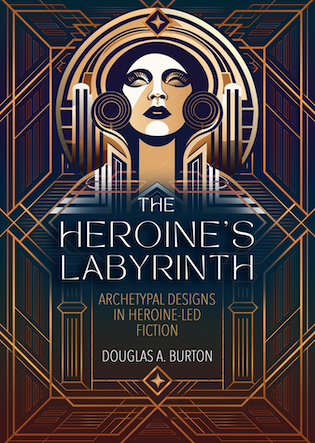
The Heroine’s Labyrinth
Douglas A. Burton
Publication date: March 24th 2024
Genres: Non-fiction
For decades, the hero’s journey has had a major influence on storytelling and story structure. Now, Douglas A. Burton presents a groundbreaking new paradigm for writers everywhere. Sourced entirely from heroine-led fiction—a stunning new narrative form takes shape with familiar archetypes in a never before seen outline. Burton adds something original and fascinating to the world of storytelling. Discover the dynamism of story, conflict, character development, archetypes, and heroism in an entirely new light. From myth to literature, from TV to film, The Heroine’s Labyrinth explores recurrent themes and patterns modeled by heroic women in fiction. The labyrinth model has the potential to turn conventional understanding of story structure upside down.
Inside, you’ll encounter 18 archetypal designs that form a distinctive narrative arc, each one rich with profound insights and powerful new perspectives. Discover how stories are constructed through powerful archetypes such as the Masked Minotaur, the Sacred Fire, the Beast as Ally, the Poisoned Apple, and more. Novelists, screenwriters, RPG gamers, and memoirists will gain waves of creative inspiration while reading The Heroine’s Labyrinth. You won’t be able to put it down.
“Douglas Burton has cracked the code.”
—Christopher Vogler, author of The Writer’s Journey: Mythic Structure for Writers“Burton’s prose is accessible, lucid, and concise without sacrificing detail: He moves quickly through the traits that make up his “Heroine’s Labyrinth,” substantiating his theories with more than 200 examples from texts, from the Bible to Barbie. “
—Kirkus Reviews“The Heroine’s Labyrinth is a must-read for storytellers seeking to expand their craft and embrace the transformative potential of female-centric storytelling.”
—K.C. Finn, author of the Shadeborn series
Goodreads / Amazon / Barnes & Noble
—
EXCERPT:
A DIFFERENT KIND OF JOURNEY
So, why a labyrinth? While watching the film version of The Shining, I concluded that the story is actually about Wendy Torrance, the true heroine of the tale. The star power of Jack Nicholson misled me into thinking the story was about Jack Torrance. Once I rewatched the film as a story about a heroine, my entire understanding of the story shifted. Near the beginning of the film, Wendy tours the Overlook Hotel and comments, “I feel like I have to leave a trail of breadcrumbs.” Her statement, which also references the cautionary folktale, Hansel and Gretel, struck me as an intriguing piece of story exposition. The tour showed Wendy the many hallways, chambers, and dead ends she’d soon have to navigate at the Overlook Hotel. Wendy Torrance was in a labyrinth. As if to further emphasize this thematic reality, a real labyrinth—the infamous hedge maze—lay just outside, a perfect literary complement to the symbolism of the heroine’s setting.
Th is first and most basic orientation sets the tone for the entire story you plan on telling, whether it’s fiction, a personal memoir, or even a roleplaying adventure. The nature of the journey determines the nature of the conflict, which often defines the villain. These are organic structures that emerge within a story. Th e hero’s journey plots a linear course, traveling from point A to point B, ever onward, further from home and into unfamiliar environs before returning home. However, many heroines in fiction go on a different journey, one characterized by repetitive circles and often closer to home. Indeed, most heroines never leave the native culture. The adventure hides behind closed doors and interior spaces of otherwise familiar places. The journey travels inward and creates incredible friction while the heroine develops her sense of identity and self-realization. So, many heroine-centric stories feature heroines in conflict with their native culture, and this conflict lays the groundwork for the entire narrative structure I call the “Heroine’s Labyrinth.”

Author Bio:
Douglas A. Burton is a novelist and storyteller whose various works emphasize heroic women in fiction. Burton’s debut historical novel, Far Away Bird, brought Byzantine Empress Theodora to life through an intimate biographical account. The novel collected numerous awards including gold medals for the IBPA’s Best New Voice in Fiction, Readers’ Favorite Historical Personage, and eLit’s Best Historical Fiction eBook. Far Away Bird was also a finalist for the Montaigne Medal (Eric Hoffer Book Award) and Screencraft’s Cinematic Book competition. Burton’s newest book, The Heroine’s Labyrinth, is a nonfiction writing craft book that offers a paradigm shift for story structure. Presented as a distinctive counterpart to the well-trodden hero’s journey, Burton explores the unique narrative arc and archetypal designs that recur in heroine-led fiction. He currently lives in Austin, TX with his wonderful wife, Crystal, and two energetic boys, Jacob and Lucas.
GIVEAWAY!
a Rafflecopter giveaway






No comments:
Post a Comment